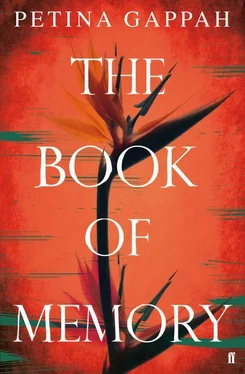I spent so much of my time on my own that I learned early to follow the thread of my own thoughts, and to watch, and be still while others talked. I learned early to distinguish between those who spoke the truth and those who lied. My habit of watching people enraged my mother. She often lashed out at me, not because I had said something she did not like, but because I had said nothing at all.
I was not always alone at Chikurubi. When I first arrived, just after I was convicted but before I was sentenced, I shared a cell with Mavis Munongwa. Mavis has been in a kind of solitary confinement for most of her life here because there are no other women with sentences as long as hers.
She has been here since the last year of Rhodesia, longer than any other prisoner or guard. For thirty years or more, she has roamed the halls of the prison, moving between the Condemn and the canteen, between her cell and the prison farm.
She has no knowledge at all of Zimbabwe, no idea of what life has been like in the last thirty years, no concept of the immense contradictions that make up this country — national unity achieved through the massacres in the south, discrimination against the white people whose Olympic victories form an integral part of the nation’s self-declared successes, the multiplicity of laws that guarantee women equality and a culture that ensures that they remain subservient.
When she talks, she talks of Salisbury, of Que Que, of Charter and Melsetter. Like the mink-and-manure set in which I once lived, the fact of independence does not translate into any reality for her. But the people that I lived amongst in Umwinsidale lived in a cocoon of privilege that was untouched by the political changes around them, while Mavis is more like that Japanese soldier who continued to fight the Second World War decades after Japan’s surrender. She simply does not know that anything has changed, and when she is confused has the vacant emptiness of a marble god.
Every name that she gets wrong is more abuse from the guards. ‘I have had enough of your boomshit,’ says Patience. ‘Acting like a deaf-moot. Do you think we still live in Rhodesia?’
On the first night in our shared cell, in long urgent whispers interrupted by fits of raspy weeping, she told me why she was here. In her life before this one, Mavis had been married in Gutu. Her husband fell sick and died suddenly. She and her brothers consulted a diviner to find out what had killed him. The diviner had told them that her sister-in-law, Mavis’s brother’s wife, and her friends in sorcery, had killed Mavis’s husband. ‘In the night, in the graveyard,’ the diviner told Mavis, ‘they feast on his flesh and drink his blood. They have made his penis into the whistle that they use to summon each other.’
Mavis bought rat poison and put it in the drinking water inside her sister-in-law’s cooking hut. But it was not Mavis’s sister-in-law, or even her sorcery friends, or her husband, who drank that water and died. Instead, it was their four children. It was Mavis’s two nieces and two nephews, aged eleven, nine, seven and three, who drank the water and died in pain on the floor of their mother’s hut.
In those nights that I shared with her, I would have given anything to be back at the police cell at Highlands. When her spirits were high, she filled the cell with manic laughter, chanting the alphabet name song over and over again. ‘Anna, Boniface, Cecilia, Dickson, Edina, Fungai, Gibson, Henry, Ida, Jakobo, Keresenzia, Lameck, Manuere, Noeri, Otilia, Patson, Que Que, Ruth, Stephen, Timothy, Urita, Vikita, Watson, Xhosa, Yachona, Zambia.’
And when her spirits were low, she groaned out the names of the children she had killed. ‘James and Lydia, Cecelia, Boniface.’
If I managed to get any sleep at all, I would wake up to find her whispering to me, telling me of the children’s distended stomachs, their bleeding mouths, their horrible death. ‘They vomited out their own intestines,’ she whispered. ‘I saw everything that was inside them. They put the bodies in my hut and refused to bury them until I told them what I did to them. They locked me in with them. They would not let me out.’
After the third night of her weeping, I could no longer take it and I shook her to keep her quiet. It made no difference. Again and again she called out, ‘You have eaten my husband. I have eaten your children. James and Lydia, Cecelia and Boniface. James and Lydia, Cecelia, Boniface,’ she sobbed. She put her hands to her cotton-white hair and rocked herself as she wept with no tears.
So when they put me on my own, I was relieved to escape. Mavis rarely goes out. The guards don’t like that she frightens the other prisoners. She sometimes acts as though she sees the dead children before her. She smiles at the empty air, holding out food and saying, ‘Eat, eat.’ When that happens, the guards put her back in her cell, from where she shouts for James and Lydia, Cecelia, Boniface.
Verity is convinced that all that time alone has made Mavis mad. Jimmy argues that it is no mere madness, but the spirits of the dead children that have come back as ngozi to haunt her. When they can find them, which is not often, the guards sometimes give her sedatives to go along with the casual, easily given diagnosis of madness. But no one has called a psychiatrist to make any kind of official diagnosis.
‘Who is going to pay for a psychiatrist — is it you?’ Loveness said, the first time I asked if Mavis had been seen by anyone. ‘And even if we find that she is quite, you know, quite mental, where will she go? There are no women in the mental ward.’
Mavis may well be better off here than on the mental ward. If they can barely afford food for us, what means do they use, without drugs, to calm the prisoners? And what of the torment that the strongest there visit upon the weak? She is better off here, poor Mavis, where every wrong name is a rap on the knuckles, where Synodia imitates her to her face and the rest ignore her when they do not mock her.
Mavis did not hang because the judges found extenuating circumstances in her case. Vernah Sithole told me that Mavis Munongwa’s was the case that set the legal precedent that a strong belief in witchcraft, like excessive alcohol or catching your wife in an adulterous coupling, could be considered extenuating circumstances in mitigating sentence, and could even go as far as amounting to provocation, which, more than mitigation, is an actual defence.
As you travel around the country, you will find that a lot of people believe in the power of witchcraft and dark magic. Jimmy is full of stories from her village in Chipinge about wives who put spells on their husbands so that when they go with other women, their genitals disappear. ‘The men become as smooth as anything down there, Memo,’ she told me. ‘ Kuite smooth kunge wonini, kunge chidhori cheplastic chekuChina chakagadzirwe nge plastic, just like a plastic doll.’
I told Jimmy about the baby in Loveness’s paper, Baby Kingsize, who had changed from boy to girl overnight. She clutched my arm and nodded. There were many such examples in Chipinge, she said, but they did not all make the papers. Perhaps this is a comparative advantage, sex-change operations without hormones and surgery, all eased through the wonder of African technology.
Jimmy did not understand what I was talking about. I explained about sex changes, but it took time to convince her that it was possible to take hormones and undergo surgery to change your sex. She only accepted it because of the authority that enveloped me, from having lived with white people. Monalisa, too, had some of this authority, but she had only worked with them. I had lived with them; I knew them inside out, thought Jimmy, so that meant if I said such things were possible then they must be possible, even though it seemed to her like a form of unnecessarily complicated witchcraft.
Читать дальше












